Blog Archives
‘The Notebook,’ Poignant, Reverent, Knockout Performances by Maryann Plunkett and Dorian Harewood
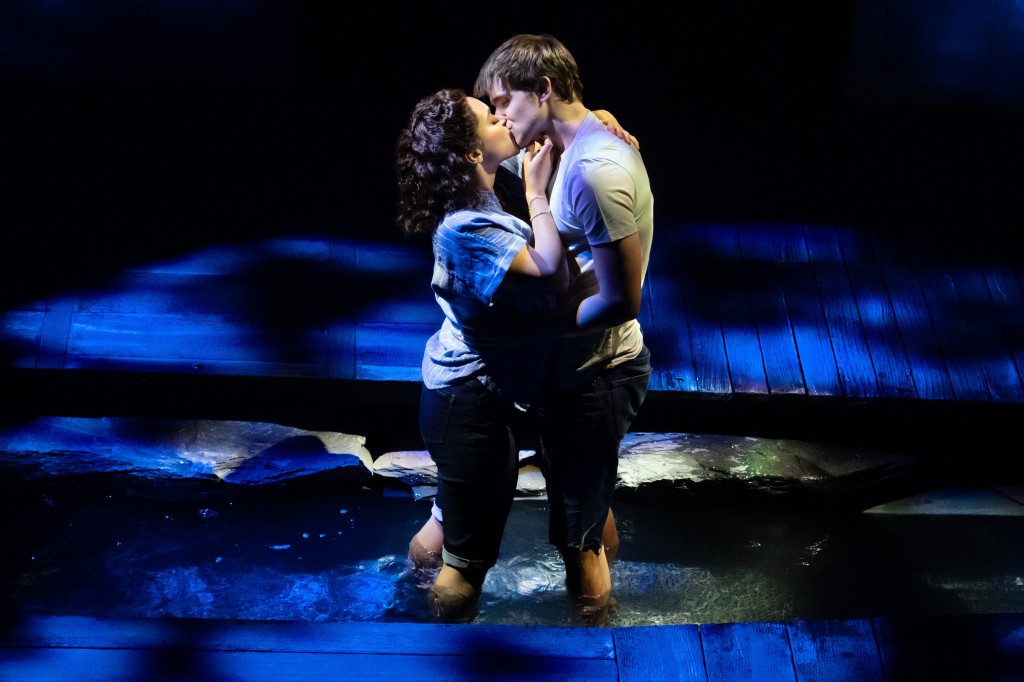
Fans who have seen the film or read Nicholas Sparks’ titular novel will not be disappointed with The Notebook on Broadway, currently running at the Gerald Schoenfeld Theatre. With music and lyrics by Ingrid Michaelson and book by Bekah Brunstettter, the musical based on the Sparks’ novel dramatizes the relationship of Noah and Allie using different couples to represent their life stages. With a few changes in the setting from the novel, young and old can appreciate the deeply personal aesthetic and profound expression of fidelity, not often seen, that reveals Allie and Noah’s intimacy and devotion to each other.
Directed by Michael Greif & Schele Williams, The Notebook’s staging is fluid and stylized, happening mostly in remembrances past. It simultaneously layers the key turning points in the stages of Allie’s and Noah’s relationship (teenage years, late twenties). Through vignettes of scenes between the young Allie (Jordan Tyson) and Noah (John Cardoza) and then the middle Allie (Joy Woods) and Noah (Ryan Vasquez), we understand how the couple’s relationship developed.
We are kept in suspense when Allie’s parents disapprove of Noah and they don’t see each other for years, each pursuing their own dreams. We learn what stood in their way to break them up, and discover how they eventually get back together again, despite their differences in background economically and socially.
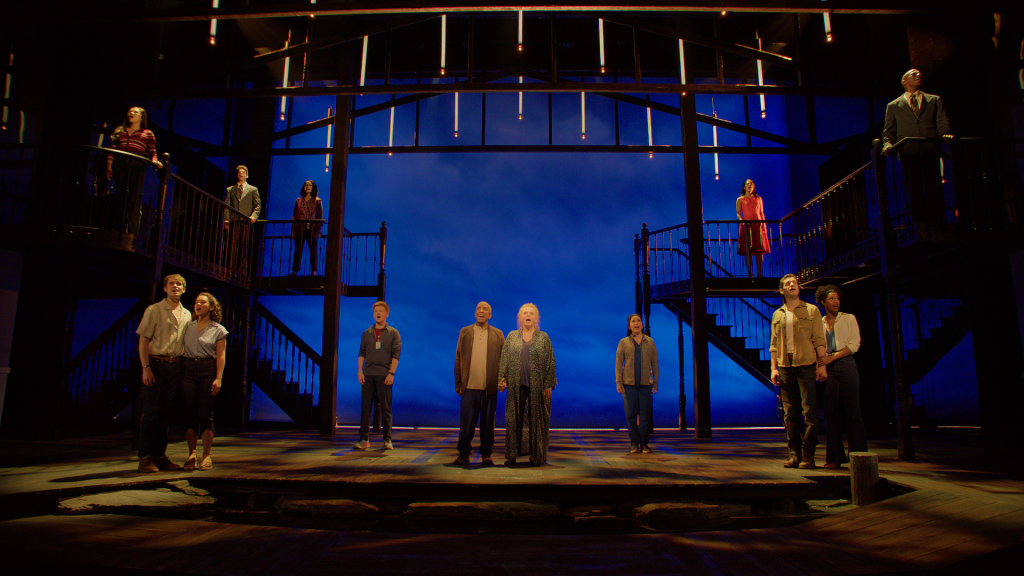
The musical takes place in the present in a nursing home where Old Noah (the superb Dorian Harewood), lives to stay near his wife Allie (an incredible Maryann Plunkett), who has degenerative Alzheimer’s. If you have not seen the film or read the novel, you are unaware of Noah’s identity and intentions until he meets with his family and they tell him he cannot afford to stay with their mom in the facility to keep her company. He has to let her go. However, their bond transcends even their children. Noah ignores them.
The strength of the musical is in Greif and Williams’ staging that suggests memory and consciousness brought to life by the journal that Noah reads daily to Allie in her room in the extended care facility. Allie wrote the memoir in remembrance of their love. Noah’s promise to read it to her was made, we learn, when she realized she was becoming immersed in the darkness and confusion of early onset Alzheimer’s. She desperately hoped her own words would trigger her consciousness and memory to maintain their powerful love connection.
The musical’s inherent focus on memory and the indeterminate nature of time in human consciousness reveals how love transcends, heals and can make memories as alive as reality. Eventually, the truth can break through, as it does by the conclusion of the musical, when Allie realizes who Noah is and why he is with her every day. If one has had experiences with relatives who have Alzheimer’s, some relate that in the midst of their relatives’ seeming insentience, there are moments of clarity that appear miraculous. How and why this occurs with this unfortunate condition remains a mystery which one day may be solved.
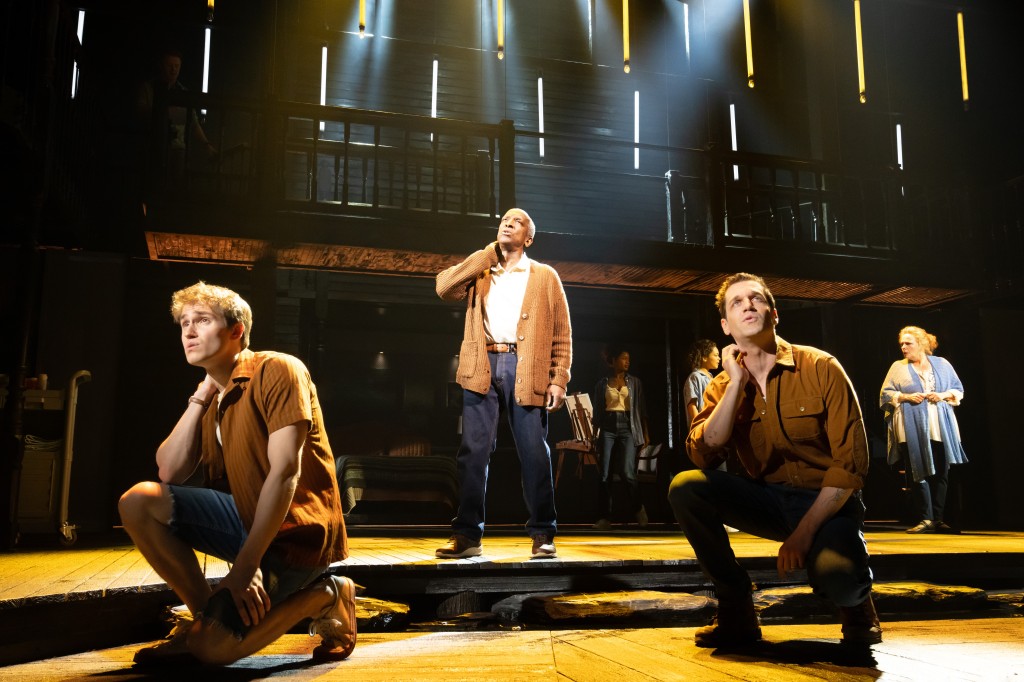
In respectful consideration of Allie’s situation, Brunstetter’s book encapsulates The Notebook from Noah’s perspective. The directors are mindful of how Noah’s memories and Allie’s words stir Allie, Noah and even Fin (Carson Stewart), who at one point picks up the journal and reads a steamy scene that humorously wows him.
Predominately, the directors strive for coherent, symbolic and meaningful interaction between the couples’ vignettes chronicling, not always in order, but thematically, the events expressing Noah and Allie’s eternal bond created before they were married. As Noah dozes in a chair and dreams of the formation of that bond between Young Noah and Young Allie, the actors are situated downstage to the edge of the proscenium, where there is water and a shoreline bathed in Ben Stanton’s beautiful, bluish tinged moonlight. The night scene conveys an atmosphere of romance. The brief dialogue indicates the couple’s youthful naivete and exuberance where anything is possible even their love. Tyson’s Allie says the words no lover wants to hear; she has to “go home” to her parents.
Ironically, these are words Older Allie in the present says to the nurses and to Old Noah, in confusion, as if she’s searching for the comfort she associates with the home she once made with her life’s partner standing before her, who she doesn’t recognize. Plunkett’s Allie, unsettled in the extended care facility, is triggered by a past that nudges just below her consciousness. She tries but fails to remember the house that Noah built just for her. If only she could get back there, she would know where she is in the present and who the old man is who comes to visit every day.
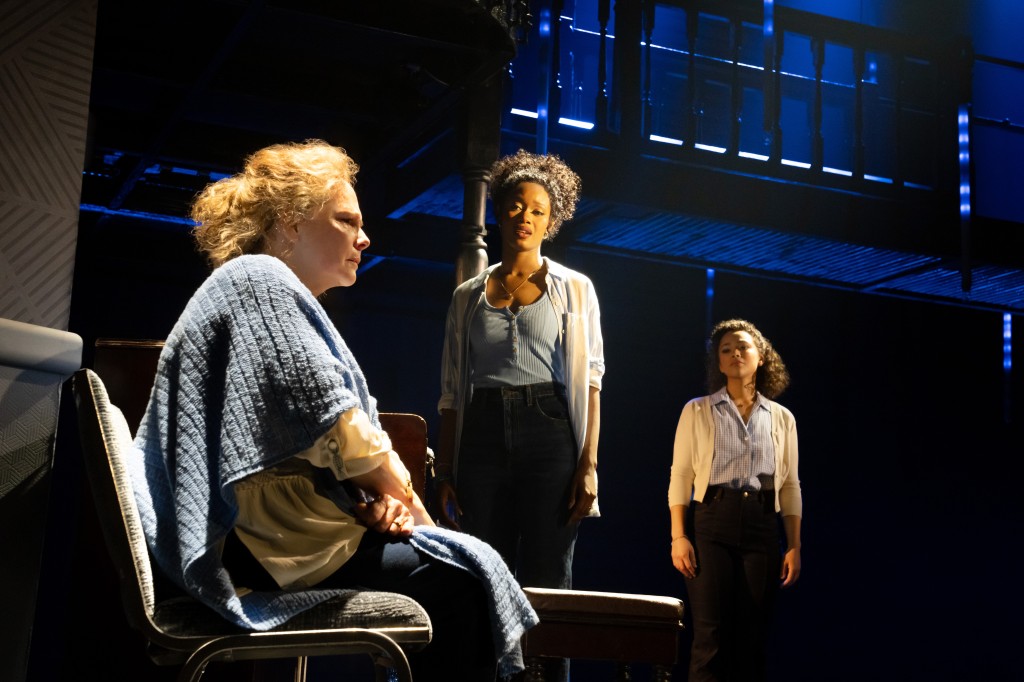
In that first moonlight and romance scene, Young Noah’s response of eternal love is that Young Allie can stay with him forever, to which she playfully agrees. Simplistic, facile teenagers make promises. However, it is the rare relationship and rare individuals who keep promises in a world of lies, canards, fakery, AI, betrayals, and deceit, where “forever” love is expressed to “get over” and treachery and selfishness are the game plan.
The Notebook is profound in its simplicity, and can be underestimated. Indeed, who is able to love forever, be faithful to one person forever, and not just give lip service to a relationship? This is a key theme of the musical, for through Noah’s unwavering fidelity and Allie’s words, we see how this is possible for this couple who loves simply and endearingly. Overall, the production manifests this theme with sincerity aided by the phenomenal performances of Plunkett and Harewood, who pivot the action forward as the Noahs and Allies affirm the beauty of the relationship in snippets of dialogue and the vitality of song.
Young Noah and Allie lightly reference a forever love which indeed comes true; both age together and Old Noah stays with Old Allie to the very end of their lives. Likewise, the promise they make as kids to see each other the next day also comes true in their lives together, even when a gulf of oblivion separates them. Old Noah sees Old Allie in her room to read from the journal in hope every day. Plunkett’s masterful effort in presenting Allie’s struggle to know her identity and Noah’s, paves the way for the payoff at the conclusion, where she remembers, and together they metaphorically return forever to the home they have made of their love.
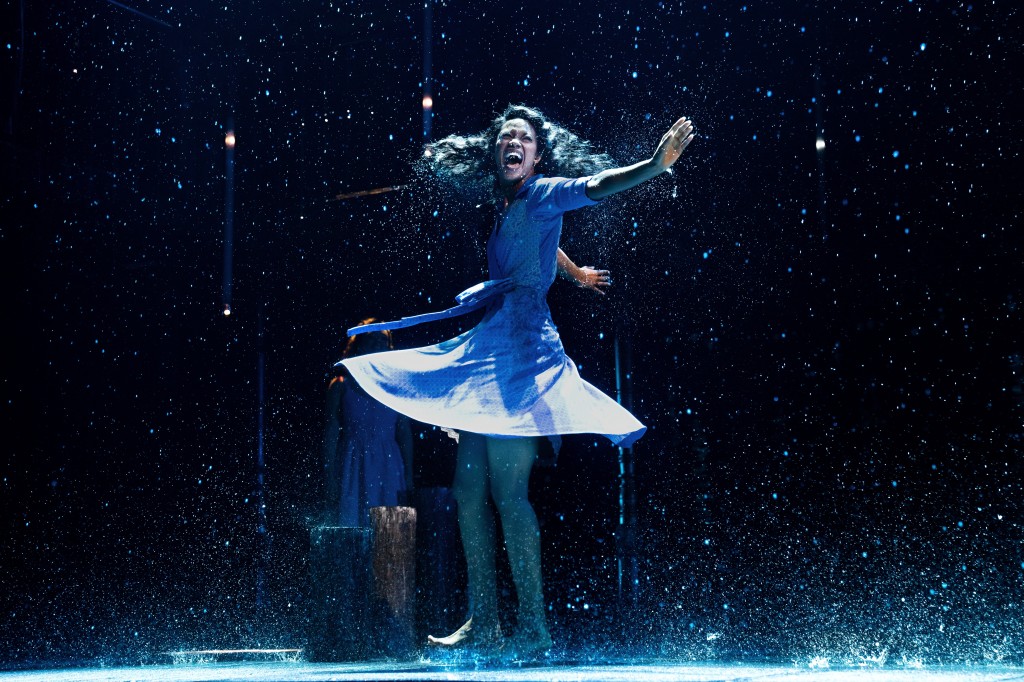
The music and songs resonate, some more forcefully, some more lyrically than others. The opening song that Harewood’s Noah sings with the ensemble (except for Older Allie), “Time,” is an inspiring and soulful ballad that embraces life’s mutability and time’s swift passage. The song summarizes the permanence of their future relationship and unfolds with the presence of the younger and middle couples who sing with Old Noah symbolizing Allie and Noah’s younger selves.
It is a soundscape of memories where they identify how they live “to keep going, keep running, keep standing, keep leaning, keep learning, keep hoping.” This premiere ballad establishes what’s to follow, as the ensemble’s voices meld with loveliness in lyrical harmonies. This first song, the song at the end of Act I, “Home,” and the final song, “The Coda” are the most powerfully wrought and most memorable and significant in relating the love and devotion of this unique couple who have been blessed in their love and faithfulness.
Throughout Act I Old Noah persists coaxing Old Allie with the journal passages, and we follow the narrative of their first kiss and first intimacy, first fight, first pledge to write to each other. The musical reveals these two are drawn to love on another level, which is the mysterious unseen of love relationships.
This is in contrast to the socially acceptable diagram of “successful love and marriage,” which Allie’s mother (Andrea Burns), wants for her daughter. Allie’s mother defines happiness by the society’s values of career success and college education, which Allie is forced to accept because of her mother’s betrayal for “Allie’s own good.”
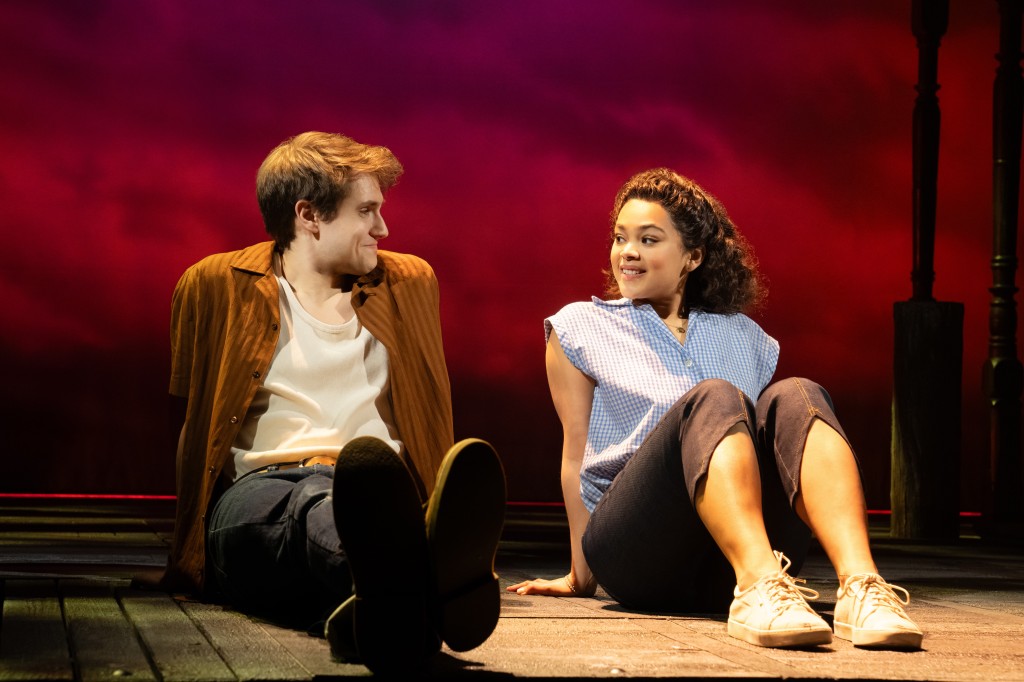
However, Allie and Noah’s relationship, unlike Allie’s mother and father’s relationship, is not defined by material things and upward social mobility. Though Brunsetter doesn’t mention “spiritual” vs. “material,” the undercurrents are clear when the excellent Joy Woods’ Middle Allie in her solo numbers affirms who she is and who she wants to be (“Leave the Light On,” “My Days”). To what extent Noah is a part of who she wants to be, she discovers when she returns to the town and is drawn by curiosity and an unconscious, perhaps spiritual desire to locate the house Noah has built and outfitted for her with his superb carpentry and woodworking skills.
In the subsequent scene the invisible bond between them manifests. We discover what prevented them from being together sooner in a powerful scene between Burns’ mother and Woods’ Middle Allie. Instead of belaboring additional details, Brunstetter moves the action to its foreshadowed conclusion. This doesn’t occur before a few suspenseful, gyrating events in flashback and in the present. One is that Old Noah, who is in the hospital after a stroke, won’t be able to keep his promise to rekindle Allie’s memory ever again.
Kudos to the creative team who carried the directors’ visions for The Notebook. These include David Zinn & Brett J. Banakis (scenic design), Paloma Young’s color coordinated costume costume design, Ben Stanton’s lighting design, Nevin Steinberg’s sound design (I could hear every word) and Mia Neal’s Hair & Wig Design. Additional kudos to Carmel Dean’s music supervision and arrangements and Katie Spelman’s choreography.
The Notebook is a must-see because of the performances and the directors’ vision in bringing reality to a popular work of fiction. Ignore the pandering “tear-jerker” comments by some critics for whom fidelity and eternal love may be empty promises.
The Notebook, one intermission runs until November 24th. Gerald Schoenfeld Theatre, 236 West 45th Street between 7th and 8th. https://notebookmusical.com/tickets/
.